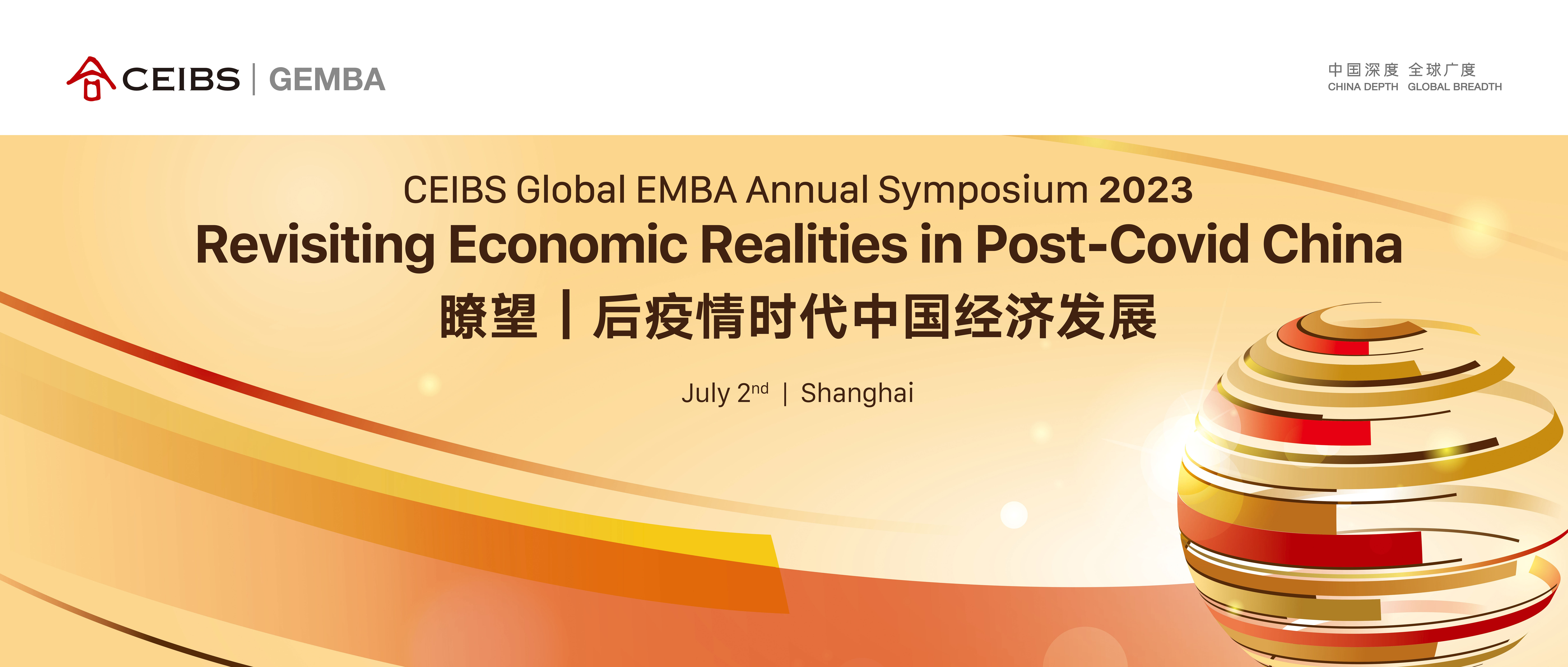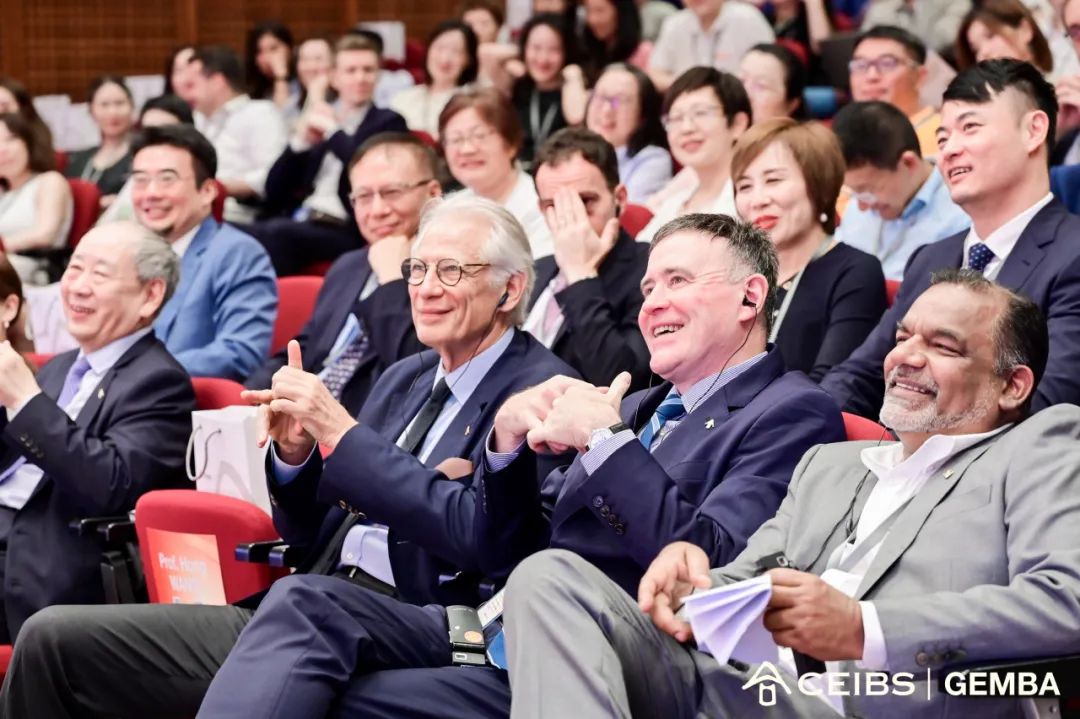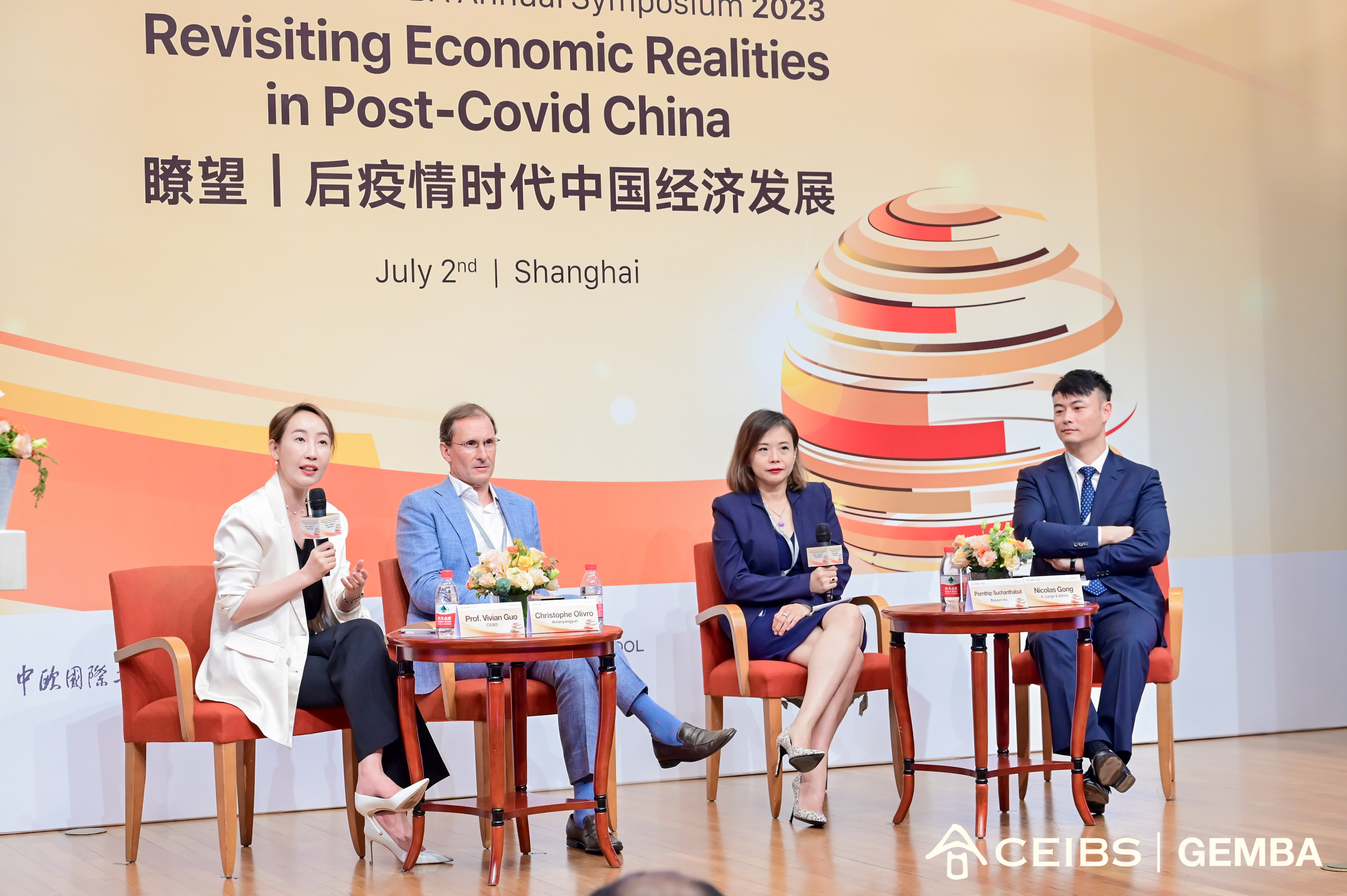How will China develop its Post-Covid economy?

On July 2nd 2023, the CEIBS Global EMBA hosted its second annual symposium, providing a very welcome return to live events after the years of pandemic-related disruption. Bringing together nearly 300 CEIBS current students, alumni, faculty members as well as guest panellists and speakers, this event gave everyone in attendance the chance to consider how China will adapt to the new economic realities of the post-covid world.
Covering subjects as diverse as brand development in China, sector-specific innovation methods and the role of international collaboration in promoting stability, the symposium presented a snapshot of the key issues, challenges and opportunities China faces right now as it settles into its expanding global role.
Listen, learn, reflect – a moment to consider an increasingly complex world
Acting as MC for the symposium, CEIBS Professor of Economics, Associate Dean and Director of the Global EMBA programme, Professor Bala Ramasamy opened proceedings with an introduction highlighting the importance of building bridges in an age of uncertainty.
Professor Bala Ramasamy
Today is a chance for us all to listen and learn about what companies are doing in response to the complex challenges we all face in today’s rapidly changing world. This programme’s vision is to always be a bridge between China and the world, and bridges are exactly what we need to promote mutual understanding and a deeper appreciation of our differences as well as our common values.
Echoing that sentiment, CEIBS President Professor Wang Hong gave an opening speech discussing just how quickly the global economy is changing, and how China is continuing to focus on delivering a new kind of growth that is driven by “quality over quantity” while reaching out to the world as a partner in good faith.
Professor Wang Hong
Economic growth is a key consideration for any nation, but we must not fall into the trap of thinking purely about the development of China’s economy; its politics, education, international relationships, culture and lifestyle are all crucial considerations too. CEIBS has a unique role as a platform for economic and cultural exchange and cooperation between China, Europe and the rest of the world. The future is our shared goal, so we must work together to achieve it. China is building for the future, and its strengthening relationship with Europe and other key partners is emblematic of the peaceful rise that China aims to achieve, creating win-win situations while tackling global challenges and promoting humanity’s shared progress.
Birth of a New Global Economy – The Pandemic has changed the rules
For this year’s keynote speech, CEIBS was thrilled to welcome back one of its Distinguished Professors (and former Prime Minister of France) Professor Dominique de Villepin. Introduced by CEIBS Vice President and Dean, Professor Frank Bournois, as a “highly distinguished diplomat, author and tireless advocate for global cooperation”, Professor de Villepin gave an insightful address regarding the new state of global economics, politics, and where China fits into the changing landscape.
Professor Frank Bournois
Dominique de Villepin incarnates everything that CEIBS is about. He embodies ‘China Depth’ with his deep interest and understanding of Asia, its history, geographies and cultures – this is at the heart of CEIBS’ DNA. As for ‘Global Breadth’, he understands precisely how history, culture and current-day politics and decision-making intersect. From his address, you will see that to be effective leaders, you must have more than intellectual skills; interpersonal skills and adaptiveness play a vital role too.
Professor Dominique de Villepin
“Even if COVID has left the building, in three years the world has changed, and it will never be the same. A new global economy is forming and it doesn’t play by the old rules. Unfortunately, the world today features much more suspicion than cooperation, and this is driving the fragmentation of globalisation while also driving the world into opposing spheres of influence. Today, tech-based innovation is essential to any nation’s core competitiveness, and it’s pushing a new kind of economic growth where consumers favour quality over quantity and companies must respond accordingly. The division is becoming clearer between the companies who embrace ESG and those who don’t care. In the new economy, where consumers are more discerning and socially aware, the latter will be left behind.”
While the attitude of private companies will be crucial in building a sustainable new global economy, equally important is the role of nation state governments and international organisations dedicated to promoting stability and global progress. Taking the example of automation and the gig economy, Professor de Villepin examined the growing importance of regulation as a means of controlling economic growth outcomes. He explained the nations will strive to create the best and most precise regulations to maintain control of key tech-based markets.
In closing, the professor focused on the positive factors that point towards the possibility of building a more stable and sustainable world. He highlighted Europe’s role as a mediating and balancing influence in the current US/China rivalry. Finally, he cited art and culture as a vital ingredient in the struggle to promote global harmony.
“Historically, best way to avoid crisis and war is through the building of bridges. One kind of bridge is the sharing of culture and art. Sharing common cultural values or general principles is something that makes the whole planet better. This is the key to ‘soft power’, and China has huge potential to grow it. Since the end of World War One, the world has been culturally dominated by the dream of the ‘American Way’ – from Hollywood to Coca Cola, people everywhere have been envious of the US lifestyle. If China is to be a world leader in soft power as well as economic power, it must ask itself: What will make the rest of the world think of China in the same way?”

Panel 1 – Hitting a Constantly Moving Target: How will Local and International Brands Compete to Capture the Chinese Consumer Market in 2023?
Following the keynote speech was the first of the symposium’s two panel discussions, each looking at China’s economic development from two very different perspectives. CEIBS Associate Professor of Strategy and Entrepreneurship Vivian Guo introduced this first panel as its moderator, calling on the three panellists to explore the current state of Chinese consumerism and how it is inspiring new ways of reaching out to any given target audience.
Panellists:
Mr. Christophe Olivro – Regional Director, Aman China, GM, Amanyanyun
Ms. Pornthip Suchanthabut – Vice President, Baozun Inc.
Mr. Nicholas Gong – Managing Director APAC, A.Lange&Sohne

(Left to right: Prof. Vivian Guo, Mr. Christophe Olivro, Ms. Pornthip Suchanthabut, Mr. Nicholas Gong)
While they come from different industries and sectors, all the panellists emphasised the importance of maintaining a consistent brand image across all platforms and touch points. Brands shouldn’t rush to change themselves to accommodate new trends in technology, fashion or consumer preferences, but must remain open to them. Technology provides plenty of new ways to frame a brand’s message in way that is suitable for different audiences without compromising the integrity or consistency of the brand itself. They also advised Chinese brands to be patient, to remember that branding is a long journey, and rushing to market can kill a brand as quickly as it can build it.
Panel 2: Innovation in China – How to leverage an open innovation mindset?
When considering China’s future, the discussion of innovation is inevitable. It’s a source of competitive advantage that China must build to maintain its growth and evolving global role. This was the conclusion of the second panel and its moderator, CEIBS Associate Professor of Management Practice and Academic Director of CEIBS eLab Majid Ghorbani.
Panellists:
Dr. Simon Yang – President, APTIV Asia Pacific
Mr. Adam Ge – CEO China, Israel Landa Group
Dr. Zili Li – Vice President and Head of Asia Pacific R&D, Janssen Research and Development, Johnson & Johnson
Mr. Ludovic Weber – CEO Asia Pacific, Saint-Gobain
(Left to right: Prof. Majid Ghorbani, Dr. Simon Yang, Mr. Adam Ge, Dr. Zili Li, Mr. Ludovic Weber)
Between them, the panellists outlined how innovation is at the heart of their respective industries and how China has many homegrown advantages in terms of its entrepreneurial business culture and a willingness to try new approaches. Equally, the panel agreed that innovation occurs most readily and successfully when open minds collaborate, so international partnerships between China and the rest of the world will continue to represent an invaluable source of open innovation.
Brave New World – New directions for China to Explore
Signalling the end of the second CEIBS Global EMBA annual symposium, Professor Bala reminded the audience of the importance of cooperation and open dialogue in this increasingly uncertain world. Thanking everyone involving in the creation of the event, the professor hoped that the audience would take the conversation one step further.
Uncertainty, complexity, audacity, courage – these are all important terms that can help us navigate this new world order we’re living in. I think that our speakers and panellists have aptly demonstrated that when considering the future, the best conversations are those you can openly reflect on, learn from, consider and share. Hopefully you have a clearer idea of how China will fit into this new world economy, and how you will fit into it too. If you take anything away from this event, think about how this kind of open conversation will benefit you, your company, your industry, the whole world, and bring that mentality back with you.












